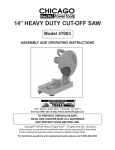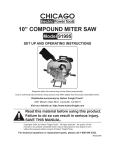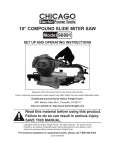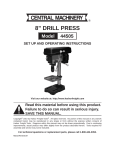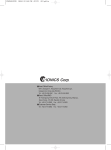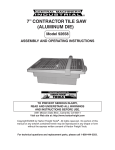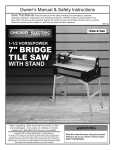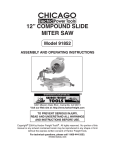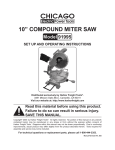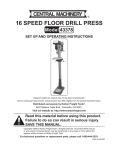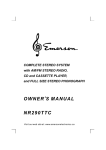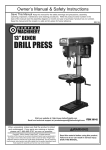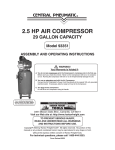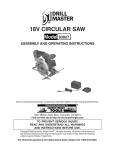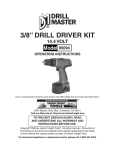Download Harbor Freight Tools 92386 User's Manual
Transcript
7” 1.5 HP TILE SAW WITH STAND 92386 Assembly And Operation Instructions Due to continuing improvements, actual product may differ slightly from the product described herein. ® 3491 Mission Oaks Blvd., Camarillo, CA 93011 Visit our website at: http://www.harborfreight.com To prevent serious injury, read and understand all warnings and instructions before use. Copyright© 2005 by Harbor Freight Tools®. All rights reserved. No portion of this manual or any artwork contained herein may be reproduced in any shape or form without the express written consent of Harbor Freight Tools. For technical questions or replacement parts, please call 1-800-444-3353. PRODUCT SPECIFICATIONS E105017 Electrical Requirements Coolant Pump Type Required Blade Size / Style Maximum Cutting Depth Maximum Cutting Length Maximum Tile Size Saw Bevel Capacity Miter Gauge Capacity Rip Fence Scale Spindle Size Fence Type Coolant Basin Capacity Basin Dimensions Work Table Dimensions Overall Dimensions Weight Accessories 120 V / 60 Hz / 3550 RPM / 1.5 HP/ Single Phase 3-Prong Power Cord Plug / Power Cord Length: 9 Ft Submersible Fountain Pump w/Flow Adjustment / 246 GPH Capacity 7” Diameter / Continuous Rim Diamond Blade / Minimum 3550 RPM 1” @ 90° / 1” @ 45° 25-3/8” 24” x 24” 0° to 45° in 2.5° Increments – Left Tilt Only 0° to 45° in 1° Increments – Right Angles Only 0” to 8-1/4” in 1/8” Increments / 0mm to 21mm in 2mm Increments 5/8” Fixed 4 Gallons 15” W x 22-3/4” L x 3-1/8” H 18” W x 32-3/4” L 18-1/4” W x 42-1/4” L x 47-1/2” H 89 Pounds Arbor Nut Wrenches (Qty. 2) / 7” Diameter Saw Blade (Qty. 1) SAVE THIS MANUAL You will need this manual for the safety warnings and precautions, assembly, operating, inspection, maintenance and cleaning procedures, parts list and assembly diagram. Keep your invoice with this manual. Write the invoice number on the inside of the front cover. Keep this manual and invoice in a safe and dry place for future reference. UNPACKING When unpacking, check to make sure all the parts shown on the Parts Lists on page 23 are included. If any parts are missing or broken, please call Harbor Freight Tools at the number shown on the cover of this manual as soon as possible. GENERAL SAFETY RULES IMPORTANT SAFETY INSTRUCTIONS WARNING! READ AND UNDERSTAND ALL INSTRUCTIONS Failure to follow all instructions listed below may result in electric shock, fire, and/or serious injury. SAVE THESE INSTRUCTIONS SKU 92386 REV 08/05; REV 12/06 For technical questions, please call 1-800-444-3353. Page WORK AREA 1. Keep your work area clean and well lit. Cluttered and dark work areas invite accidents. 2. Do not operate power tools in explosive atmospheres, such as in the presence of flammable liquids, gases, or dust. Power tools create sparks which may ignite the dust or fumes. 3. Keep bystanders, children, and visitors away while operating a power tool. Distractions can cause you to lose control. ELECTRICAL SAFETY 1. Grounded tools must be plugged into an outlet properly installed and grounded in accordance with all codes and ordinances. Never remove the grounding prong or modify the plug in any way. Do not use any adapter plugs. Check with a qualified electrician if you are in doubt as to whether the outlet is properly grounded. If the tool should electrically malfunction or break down, grounding provides a low resistance path to carry electricity away from the user. 2. Avoid body contact with grounded surfaces such as pipes, radiators, ranges, and refrigerators. There is an increased risk of electric shock if your body is grounded. 3. Do not expose power tools to rain or wet conditions. Water entering a power tool will increase the risk of electric shock. 4. Do not abuse the Power Cord. Never use the Power Cord to pull the Plug from an outlet. Keep the Power Cord away from heat, oil, sharp edges, or moving parts. Replace damaged Power Cords immediately. Damaged Power Cords increase the risk of electric shock. 5. When operating a power tool outside, use an outdoor extension cord marked “W-A” or “W”. These extension cords are rated for outdoor use, and reduce the risk of electric shock. PERSONAL SAFETY 1. Stay alert. Watch what you are doing, and use common sense when operating a power tool. Do not use a power tool while tired or under the influence of drugs, alcohol, or medication. A moment of inattention while operating power tools may result in serious personal injury. 2. Dress properly. Do not wear loose clothing or jewelry. Contain long hair. Keep your hair, clothing, and gloves away from moving parts. Loose clothes, jewelry, or long hair can be caught in moving parts. SKU 92386 For technical questions, please call 1-800-444-3353. Page 3. Avoid accidental starting. Be sure the Power Switch is off before plugging in. Plugging in power tools with the Power Switch on invites accidents. 4. Remove adjusting keys or wrenches before turning the power tool on. A wrench or a key that is left attached to a rotating part of the power tool may result in personal injury. 5. Do not overreach. Keep proper footing and balance at all times. Proper footing and balance enables better control of the power tool in unexpected situations. 6. Use safety equipment. Always wear eye protection. Wear an ANSI approved full face shield and non-skid safety shoes. ANSI approved hearing and breathing protection must be used for appropriate conditions. TOOL USE AND CARE 1. Use clamps (not included) or other practical ways to secure and support a smaller workpiece to a stable platform. Holding the work by hand or against your body is unstable and may lead to loss of control. 2. Do not force the tool. Use the correct tool for your application. The correct tool will do the job better and safer at the rate for which it is designed. 3. Do not use the power tool if the Power Switch does not turn it on or off. Any tool that cannot be controlled with the Power Switch is dangerous and must be replaced. 4. Disconnect the Power Cord Plug from the power source before making any adjustments, changing accessories, or storing the tool. Such preventive safety measures reduce the risk of starting the tool accidentally. 5. Store idle tools out of reach of children and other untrained persons. Tools are dangerous in the hands of untrained users. 6. Maintain tools with care. Keep tools clean. Properly maintained tools are easier to control. Do not use a damaged tool. Tag damaged tools “Do not use” until repaired. 7. Check for misalignment or binding of moving parts, breakage of parts, and any other condition that may affect the tool’s operation. If damaged, have the tool serviced before using. Many accidents are caused by poorly maintained tools. 8. Use only accessories that are recommended by the manufacturer for your model. Accessories that may be suitable for one tool may become hazardous when used on another tool. SKU 92386 For technical questions, please call 1-800-444-3353. Page SERVICE 1. Tool service must be performed only by qualified repair personnel. Service or maintenance performed by unqualified personnel could result in a risk of injury. 2. When servicing a tool, use only identical replacement parts. Follow instructions in the “Inspection, Maintenance, And Cleaning” section of this manual. Use of unauthorized parts or failure to follow maintenance instructions may create a risk of electric shock or injury. GROUNDING WARNING! Improperly connecting the grounding wire can result in the risk of electric shock. Check with a qualified electrician if you are in doubt as to whether the outlet is properly grounded. Do not modify the power cord plug provided with the tool. Never remove the grounding prong from the plug. Do not use the tool if the power cord or plug is damaged. If damaged, have it repaired by a service facility before use. If the plug will not fit the outlet, have a proper outlet installed by a qualified electrician. Grounded Tools: Tools With Three Prong Plugs 1. Tools marked with “Grounding Required” have a three wire cord and three prong grounding plug. The plug must be connected to a properly grounded outlet. If the tool should electrically malfunction or break down, grounding provides a low resistance path to carry electricity away from the user, reducing the risk of electric shock. (See Figure A.) 2. WARNING: To reduce the risk of electroncution, keep all connections dry and off the ground. Do not touch plug with wet hands. Ground Fault Circuit Interrupter (GFCI) protection should be provided on the circuit(s) or outlet)s) to be used for the tile saw (GFCI is not included in this machinery). Receptacles are available having built-in GFCI protection and may be used for this measure of safety. 3. The grounding prong in the plug is connected through the green wire inside the cord to the grounding system in the tool. The green wire in the cord must be the only wire connected to the tool’s grounding system and must never be attached to an electrically “live” terminal. (See Figure A.) REV 12/06 SKU 92386 For technical questions, please call 1-800-444-3353. Page 4. Your tool must be plugged into an appropriate outlet, properly installed and grounded in accordance with all codes and ordinances. The plug and outlet should look like those in the following illustration. (See Figure A.) FIGURE A Extension Cords 1. Grounded tools require a three wire extension cord. Double Insulated tools can use either a two or three wire extension cord. 2. As the distance from the supply outlet increases, you must use a heavier gauge extension cord. Using extension cords with inadequately sized wire causes a serious drop in voltage, resulting in loss of power and possible tool damage. (See Figure B, next page.) 3. The smaller the gauge number of the wire, the greater the capacity of the cord. For example, a 14 gauge cord can carry a higher current than a 16 gauge cord. (See Figure B.) 4. When using more than one extension cord to make up the total length, make sure each cord contains at least the minimum wire size required. (See Figure B.) 5. If you are using one extension cord for more than one tool, add the nameplate amperes and use the sum to determine the required minimum cord size. (See Figure B.) 6. If you are using an extension cord outdoors, make sure it is marked with the suffix “W-A” (“W” in Canada) to indicate it is acceptable for outdoor use. 7. Make sure your extension cord is properly wired and in good electrical condition. Always replace a damaged extension cord or have it repaired by a qualified electrician before using it. 8. Protect your extension cords from sharp objects, excessive heat, and damp or wet areas. REV 03/05 SKU 92386 For technical questions, please call 1-800-444-3353. Page RECOMMENDED MINIMUM WIRE GAUGE FOR EXTENSION CORDS* (120 or 240 VOLT) NAMEPLATE AMPERES EXTENSION CORD LENGTH (at full load) 25 Feet 50 Feet 75 Feet 100 Feet 150 Feet 0 – 2.0 18 18 18 18 16 2.1 – 3.4 18 18 18 16 14 3.5 – 5.0 18 18 16 14 12 5.1 – 7.0 18 16 14 12 12 7.1 – 12.0 18 14 12 10 - 12.1 – 16.0 14 12 10 - - 16.1 – 20.0 12 10 - - - FIGURE B * Based on limiting the line voltage drop to five volts at 150% of the rated amperes. Symbology Double Insulated Canadian Standards Association Underwriters Laboratories, Inc. V~ A Volts Alternating Current Amperes n0 xxxx/min. No Load Revolutions per Minute (RPM) SKU 92386 For technical questions, please call 1-800-444-3353. Page SPECIFIC SAFETY RULES 1. Maintain labels and nameplates on the Tile Saw. These carry important information. If unreadable or missing, contact Harbor Freight Tools for a replacement. 2. Use the right product for the right job. There are certain applications for which this product was designed. Do not use small equipment, tools, or attach-ments to do the work of larger industrial equipment, tools, or attachments. Do not use this product for a purpose for which it was not intended. 3. This product must continuously run with cold water. Dry running will cause serious damage to the Pump seals. 4. WARNING! Keeps hands and fingers away from cutting area and Saw Blade. Use a “push stick” (not included) when necessary. 5. Check Blade Guard for proper forward/backward movement before each use. Do not operate the Tile Saw if the Blade Guard does not move freely. Make sure the Blade Guard moves freely and does not touch the Saw Blade or any other part of the Saw, in all angles and depths of cut. 6. Do not handle the Power Switch with wet hands. 7. Make sure the Tile Saw is located on a flat, level, sturdy surface capable of supporting the weight of the Saw and work pieces. 8. Always use Diamond Saw Blades with a 7” diameter, 5/8” round arbor hole, and rated at 3550 RPM or greater. 9. Use the Tile Saw only for cutting ceramic tile, quarry tile, marble, terra-cotta, and slate with a maximum thickness of 1” if cutting at a 90 degree angle or 1” if cutting at a 45 degree angle. 10. Do not use the Tile Saw for cutting metals or for cutting curves. This may cause the Saw Blade to break and/or reduce it s service life. 11. Make sure the Saw Blade is wet at all times when cutting. 12. Keep all electrical connections dry and off the ground. REV 12/06 SKU 92386 For technical questions, please call 1-800-444-3353. Page POWER CORD TILE SAW 120 VOLT, GROUNDED ELECTRICAL OUTLET DRIP LOOP FIGURE C 13. Always arrange a “drip loop” in the Power Cord connecting the Tile Saw to a 120 volt, grounded, electrical outlet. A drip loop is that part of the Power Cord below the level of the outlet, or the connector if an extension cord is used, to prevent water traveling along the Power Cord and coming in contact with the outlet. If the Power Plug or electrical outlet does get wet, do not unplug the Power Cord. Disconnect the fuse or circuit breaker that supplies power to the tool. Then, unplug and examine for presence of water in the outlet. (See Figure C.) 14. Use cold water only. Never use hot water. Using hot water can damage the Pump seals. 15. Never run the Tile Saw without a water supply. Running the unit without a water supply will cause irreparable damage to the Pump. 16. Make sure the water supply used for the Tile Saw is not dirty, sandy, and does not contain any corrosive chemical products. 17. Make sure to change the water when necessary while in use and rinse out the Tub after every use. 18. Never leave the Tile Saw unattended when it is plugged into an electrical outlet. Turn off the Tile Saw, and unplug it from its electrical outlet. 19. Always keep the water level at the recommended level. Fill the Tank with enough water so that the Pump is about 3/4 completely submerged, but not so much water that the Tank overflows. 20. Avoid splashing water on the Motor, Power Switch, Power Cord, or any other electrical component. Make sure to stand on a dry, insulated surface such as a rubber mat while using the Tile Saw. 21. To avoid accidental injury, always wear heavy duty work gloves when changing the Saw Blade. Before using the Tile Saw, make sure the Saw Blade is properly mounted on the Saw Spindle. Make sure the Saw Blade is balanced, and is not cracked or bent. SKU 92386 For technical questions, please call 1-800-444-3353. Page 22. The Saw Blade will become hot while cutting. Allow the Saw Blade to completely cool before handling. 23. Allow the Saw Blade to spin up to full speed before feeding a workpiece into it. When turning off the Tile Saw, allow the Saw Blade to spin down and stop on its own. Do not press against the Saw Blade to stop it. 24. Do not force the workpiece into the Saw Blade when cutting. Apply moder-ate pressure, allowing the Saw Blade to cut without being forced. 25. Turn off the Tile Saw and allow the Saw Blade to stop on its own if the Saw Blade is to be backed out of an uncompleted cut. 26. Never attempt to remove material stuck in the moving parts of the Tile Saw while it is plugged in and running. 27. When cutting a large workpiece make sure its entire length is properly supported. If necessary, use a roller stand (not included) with larger work pieces. 28. Never stand on the Tile Saw. Serious injury could result if the Tile Saw is tipped or if the rotating Saw Blade is accidently contacted. 29. Industrial applications must follow OSHA requirements. 30. For your safety: In extreme working conditions, sensors in the Tile Saw will automatically switch off the Motor to prevent overheating. In this event, turn the Power Switch to its “OFF” position. Wait five minutes or until the Motor has cooled. Making sure your hands are dry, depress the Circuit Breaker. Then, turn the Power Switch to its “ON” position to resume cutting. NEVER attempt to disable the Circuit Breaker. 31. Never attempt to cut more than one tile at a time. 32. Never attempt to cut freehand. Make sure the tile to be cut is pressed firmly against the Rip Fence. 33. Never cut pieces too small to be held securely against the Rip Fence without leaving enough space for the hand to be a safe distance from the Saw Blade. 34. Make sure the tile to be cut off has sufficient room to move sideways. Failure to do so may result in the tile binding against the Saw Blade. 35. Make sure the Table and surrounding area are clear with the exception of the tile to be cut. 36. Always turn off the Tile Saw and unplug it from its electrical outlet before changing accessories or performing any inspection, maintenance, or cleaning procedures. SKU 92386 For technical questions, please call 1-800-444-3353. Page 10 37. WARNING! Some dust created by power sanding, sawing, grinding, drilling, and other construction activities, contain chemicals known (to the State of California) to cause cancer, birth defects or other reproductive harm. Some examples of these chemicals are: lead from lead-based paints, crystalline silica from bricks and cement and other masonry products, arsenic and chromium from chemically treated lumber. Your risk from these exposures varies, depending on how often you do this type of work. To reduce your exposure to these chemicals: work in well ventilated areas, and work with approved safety equipment such as those dust masks that are specially designed to filter out microscopic particles. (California Health & Safety Code § 25249.5, et seq.) 38. WARNING! People with pacemakers should consult their physician(s) before using this product. Operation of electrical equipment in close proximity to a heart pacemaker could cause interference or failure of the pacemaker. 39. WARNING! The warnings and cautions discussed in this manual cannot cover all possible conditions and situations that may occur. It must be understood by the operator that common sense and caution are factors which cannot be built into this product, but must be supplied by the operator. SAVE THESE INSTRUCTIONS ASSEMBLY INSTRUCTIONS NOTE: For additional information regarding the parts listed in the following pages, refer to the Assembly Diagram on page 25. 1. WARNING! Always make sure the Power Switch of the Tile Saw is in its “OFF” position and the unit is unplugged from its electrical outlet prior to assembling the unit, adding any accessories, or making any adjustments to the unit. 2. Unpack the Tile Saw, and with assistance, carefully lay the tool on its side on a flat, level floor surface. (See Figure D, next page.) REV 12/06 SKU 92386 For technical questions, please call 1-800-444-3353. Page 11 3. Pull out the Stand I (57) and Stand II (64), fully extending the Support Brackets (58). (See Figure E.) 4. With assistance, set the Tile Saw upright. (See Figure F.) 5. The Adjusting Knob (59) is located at the bottom of Stand II (64). Turn the Adjusting Knob clockwise or counterclockwise to keep the Tile Saw balanced on the floor. (See Figure F.) 6. Attach the Handle I (38) to the Motor Bracket (111), using the Bolts (98), Spring Washers (95), and Washers (94). (See Figure G.) BOTTOM VIEW CAREFULLY LAY TILE SAW ON ITS SIDE. FIGURE D SUPPORT BRACKET (58) BOTTOM VIEW STAND II (64) FIGURE E STAND I (57) SIDE VIEW STAND II (64) ADJUSTING KNOB (59) FIGURE F ADJUSTING KNOB (59) TOP VIEW MOTOR BRACKET (111) SKU 92386 HANDLE I (38) BOLTS (98) SPRING WASHERS (95) WASHERS (94) For technical questions, please call 1-800-444-3353. Page 12 Wheel Assembly 121 123 120 126 1. The Wheels (126) are connected to the Stand II (64) using Bolts (120), Lock Nuts (123) and Washers (121). (See Fig. 1, 2, 3.) Stand II (64) 2. Lift the saw stand with the front handle to move it. (as shown in figure 5) REV 04/06 SKU 92386 For technical questions, please call 1-800-444-3353. Page 13 OPERATING INSTRUCTIONS Note: The Rail Stand (41) of the Tile Saw is held in place by the packaging during shipment. Always tighten the Butterfly Knob to lock the Rail Stand prior to performing maintenance or moving the Tile Saw to another location. (See Figure H.) END VIEW RAIL STAND (41) BUTTERFLY KNOB (42) FIGURE H To Fill And Drain The Water Tray: 1. Fill the Water Tray (67) with enough clean, cold water so that the Water Pump (7) is about 3/4 submerged, but not so much water that the Water Tray overflows. (See Figure I, next page.) 2. NOTE: To prevent excessive wear on the Saw Blade (4), make sure to maintain a continuous flow of water over the entire Saw Blade while cutting. Never cut anything if the water flow is not continuous. 3. To drain the Water Tray (67), remove the Drain Plug (69) located at the bottom of the Water Tray. Once drained, replace the Drain Plug. NOTE: You may also pull out the Water Tray from the Tile Saw and pour out the water. (See Figure I.) REV 09/06 SKU 92386 For technical questions, please call 1-800-444-3353. Page 14 WATER PUMP FLOW CONTROL KNOB (7) DRAIN PLUG (69) WATER TRAY (67) FIGURE I To Make A Straight Cut: 1. WARNING! Use safety equipment. Always wear eye protection. Wear ANSI approved safety glasses under an ANSI approved full face safety shield and non-skid safety shoes. Hearing and breathing protection must be used for appropriate conditions. 2. Loosen the Butterfly Knob (47) on the Angle Cutting Guide (46) and position the Angle Cutting Guide at 90 degrees to the Scale Rail (49). Then, retighten the Butterfly Knob (47) on the Angle Cutting Guide. (See Figure J.) 3. To Adjust the width between the Angle Cutting Guide (46) and a cutting slot in the Table (44), loosen the Butterfly Knob (47) on the Scale Rail (49). Move the Scale Rail to the desired position. Then, retighten the Butterfly Knob on the Scale Rail. (See Figure J.) 4. Position the tile against the Scale Rail (49) and Angle Cutting Guide (46). (See Figure J.) position of TILE SCALE RAIL (49) BUTTERFLY KNOB (47) FIGURE J 5. TABLE (44) ANGLE CUTTING GUIDE (46) BUTTERFLY KNOB (47) Check to make sure the water level in the Water Tray (67) is at the proper level (the Water Pump (7) should be about 3/4 submerged in water). Turn the Flow Control Knob on the Water Pump (7) all the way down. Then close the Water Tray completely. (See Figure I.) SKU 92386 For technical questions, please call 1-800-444-3353. Page 15 6. Plug the Power Cord Plug (20) into the nearest 120 volt, grounded, electrical outlet, making sure to form a “drip loop” with the Power Cord. (See Figure D, page 9.) 7. Turn the Power Switch (37) to its “ON” position, and allow the Saw Blade (4) to spin up to full speed. (See Figure K.) CIRCUIT BREAKER (32) POWER SWITCH (37) FIGURE K 8. Adjust the Flow Control Knob on the Water Pump (7) until the water reaches the edge of the Saw Blade (4), just before the Saw Blade would contact the tile being cut. Make sure the Water Pump is supplying a continuous flow of water to the Saw Blade. (See Figure I, page 15.) TILE HANDLE I (38) TABLE (44) SAW BLADE (4) FIGURE L 9. Hold the tile firmly against the Angle Cutting Guide and Scale Rail (49) with one hand. Always keep fingers a safe distance away from the Blade (4). With the other hand, hold the Handle I (38) and slowly move the Saw Blade forward over the tile. (See Figure L.) REV 12/06 SKU 92386 For technical questions, please call 1-800-444-3353. Page 16 10. Continue moving the Saw Blade (4) over the tile until the cut is completed. (See Figure K, page 16.) 11. Once the cut is completed, turn the Power Switch (37) to its “OFF” position and allow the Saw Blade (4) to stop on its own. Unplug the Power Cord from its electrical outlet. Then, remove the cut tile and debris from the Table (44). (See Figure K, page 16 and Figure L, page 16.) 12. NOTE: If the Motor of the Tile Saw stops suddenly while cutting, turn the Power Switch (37) to its “OFF” position. Wait approximately 5 minutes. Reset the Circuit Breaker by pushing in the button. Then, turn the Power Switch to its “ON” position to resume cutting. (See Figure K, page 16.) 13. Note: If the Pump should fail, first try clearing the Filter (7B) of debris and make sure it is not plugged. If the Pump still does not operate properly, it must be replaced. To Make A Miter Cut: 1. Loosen the Butterfly Knob (47) on the Angle Cutting Guide (46) and position the Angle Cutting Guide at the desired angle to the Scale Rail (49). Then, retighten the Butterfly Knob (47) on the Angle Cutting Guide. (See Figure M.) 2. NOTE: For a 45 degree cut, you may also use the 45° Angle Cutting Guide (65) that is included as an accessory item. (See Figure M.) 3. To cut the tile, follow the same procedure as outlined in the section “To Make A Straight Cut” beginning on page 15 of this manual. SCALE RAIL (49) ANGLE CUTTING GUIDE (46) FIGURE M 45° ANGLE CUTTING GUIDE (65) BUTTERFLY KNOB (47) To Make A Bevel Cut; 1. Loosen the Knob I (22) on each end of the Tile Saw. Tilt the Slide Rail (26) to the desired angle as indicated on the Angle Scale (43). Then, retighten the two Knobs I. (See Figure N, next page.) 2. To cut the tile, follow the same procedure as outlined in the section “To Make A Straight Cut” beginning on page 15 of this manual. REV 12/06 SKU 92386 For technical questions, please call 1-800-444-3353. Page 17 RIGHT END LEFT END KNOB I (22) KNOB I (22) FIGURE N To Change The Saw Blade: 1. WARNING! Make sure the Power Switch (37) of the Tile Saw is in its “OFF” position and that the unit is unplugged from its electrical outlet before performing this procedure. 2. Remove the Bolts (91), Spring Washers (89), and Washers (88) from the Blade Guard (12). (See Figure O.) BLADE GUARD (12) BOLT (91) SPRING WASHER (89) WASHER (88) BOLT (91) SPRING WASHER (89) WASHER (88) FIGURE O 3. Carefully lift up and move the Blade Guard (12) aside to expose the Saw Blade (4). (See Figure P, next page.) SKU 92386 For technical questions, please call 1-800-444-3353. Page 18 BLADE GUARD (12) ROTATION ARROW OUTSIDE FLANGE (5) SAW BLADE (4) NUT (6) FIGURE P 4. CAUTION! When necessary, wear heavy duty gloves to avoid accidental cuts to hands and fingers. 5. With one Wrench (70), hold the Motor Arbor firmly in place while, with the other Wrench (71) provided, unscrew and remove the Nut (6). Next, remove the Outside Flange (5). Then, remove the old Saw Blade (4). (See Figures P and Q.) WRENCH (70) SAW BLADE (4) INSIDE FLANGE (3) (DO NOT REMOVE) WRENCH (71) FIGURE Q SKU 92386 For technical questions, please call 1-800-444-3353. Page 19 6. Install a new Saw Blade (4). Always use Diamond Saw Blades with a 7” diameter, 5/8” round arbor hole, and rated at 3550 RPM or greater. (See Figure P, previous page.) 7. IMPORTANT: When installing a Saw Blade (4), make sure the “ARROW” depicted on the side of the Saw Blade points in the same direction as that of the Blade Guard (12). (See Figure R.) 8. Once the Saw Blade (4) is installed, refasten the Outside Flange (5) and Nut (6). Make sure to tighten the Nut fully before using the Tile Saw. (See Figure P, previous page.) 9. Carefully lower the Blade Guard (12) back into its original position. Then secure the Blade Guard in place using the Bolts (91), Spring Washers (89), and Washers (88). (See Figure S.) SAW BLADE (4) ARROW BLADE GUARD (12) ARROW FIGURE R BOLT (91) SPRING WASHER (89) WASHER (88) BOLT (91) SPRING WASHER (89) WASHER (88) FIGURE S SKU 92386 For technical questions, please call 1-800-444-3353. Page 20 INSPECTION, MAINTENANCE, AND CLEANING 1. WARNING! Make sure the Power Switch (37) of the Tile Saw is in its “OFF” position and that the unit is unplugged from its electrical outlet before performing any inspection, maintenance, or cleaning procedures. 2. Before each use, inspect the general condition of the Tile Saw. Check for loose screws, misalignment or binding of moving parts, damaged electrical wiring, damaged Hoses, and any other condition that may affect its safe operation. If abnormal noise or vibration occurs, have the problem corrected before further use. Do not use damaged equipment. 3. Before each use, inspect the Saw Blade (4). Using a dull Saw Blade will cause excessive wear on the Motor, and will not produce a satisfactory cut. Replace with a new Saw Blade when needed. 4. Before each use, inspect the mounting Screws on all Safety Covers and the Arbor Nut (6) on the Motor Arbor. If necessary, retighten all loose hardware. 5. After each use, immediately clean the Water Pump (7) to keep dried debris from sticking to the Filter (7B) and Impeller which will obstruct the water flow. To clean the Water Pump, remove the Outer Cover (7A). Remove the Filter (7B). Then, remove the Inner Cover (7C) to expose the Impeller. Use a small brush and clean water to remove any debris on the Filter and Impeller. If necessary, replace the old Filter with a new Filter. When finished, replace the Inner Cover, Filter, and Outer Cover. (See Assy. Diagram.) 6. If the Water Pump (7) should fail, first try cleaning the Filter (7B) and Impeller of debris to make sure they are not plugged (see Step #5 above). If the Water Pump still does not operate properly, the Pump must be replaced. (See Assy. Diagram.) 7. To replace the Water Pump (7), remove the Water Tray (67). Locate the Pump Plug Cover (118) on the inner left side of the Frame. Unscrew and remove the Knob 119, Spring Washer (95), Washer (102), and Lock Nut (107) from the Pump Plug Cover. Remove the Pump Plug Cover to expose the Pump Cable (117). Disconnect the Pump Cable from the Water Pump. Next, disconnect the Pump Connector (115) from the Water Pump. Then, remove the old Water Pump. Install the new Water Pump, following the previously mentioned Steps in reverse order. (See Assy. Diagram.) 8. To clean the exterior parts: Use only a clean cloth and mild detergent to clean the body of the Tile Saw. Use a vacuum or compressed air to clean the Motor (1) ventilation slots. Do not immerse any electrical part of the tool in liquid. 9. When storing, always completely empty the Tile Saw of water. Frost will damage the Pump if the unit contains water. Store the Tile Saw indoors in a dry, frost-free room. SKU 92386 For technical questions, please call 1-800-444-3353. Page 21 10. CAUTION! All maintenance, service, or repairs not listed in Steps 2 through 9 in this section should only be performed by a qualified service technician. PLEASE READ THE FOLLOWING CAREFULLY THE MANUFACTURER AND/OR DISTRIBUTOR HAS PROVIDED THE PARTS LIST AND ASSEMBLY DIAGRAM IN THIS MANUAL AS A REFERENCE TOOL ONLY. NEITHER THE MANUFACTURER OR DISTRIBUTOR MAKES ANY REPRESENTATION OR WARRANTY OF ANY KIND TO THE BUYER THAT HE OR SHE IS QUALIFIED TO MAKE ANY REPAIRS TO THE PRODUCT, OR THAT HE OR SHE IS QUALIFIED TO REPLACE ANY PARTS OF THE PRODUCT. IN FACT, THE MANUFACTURER AND/OR DISTRIBUTOR EXPRESSLY STATES THAT ALL REPAIRS AND PARTS REPLACEMENTS SHOULD BE UNDERTAKEN BY CERTIFIED AND LICENSED TECHNICIANS, AND NOT BY THE BUYER. THE BUYER ASSUMES ALL RISK AND LIABILITY ARISING OUT OF HIS OR HER REPAIRS TO THE ORIGINAL PRODUCT OR REPLACEMENT PARTS THERETO, OR ARISING OUT OF HIS OR HER INSTALLATION OF REPLACEMENT PARTS THERETO. SKU 92386 For technical questions, please call 1-800-444-3353. Page 22 PARTS LIST Part Description Part Description 1 Motor 32 Circuit Breaker 2 Motor Cover 33 Capacitor Fixture I 3 Inside Flange 34 Capacitor 4 Saw Blade 35 Switch Box 5 Outside Flange 36 Capacitor Spacer 6 Nut 37 Power Switch 7 Water Pump 38 Handle I 8 Water Tube Cover 39 Handle Grip 9 Flap Holder 40 Spacer (Right) 10 Flap 41 Rail Stand (Right) 11 Thee Way Connector 42 Butterfly Knob 12 Blade Guard 43 Angle Scale 13 Water Pipe Connector 44 Table 14 Motor Support 45 Water Tube Connector 15 Cable lock 46 Angle Cutting Guide 16 Bearings Adjuster 47 Butterfly Knob 17 Bearing Bracket 48 Angle Rule Cushion 18 Bearings Axle 49 Scale Rail 19 Bearing 50 Position Bar 20 Power Cable 51 Scale 21 Water Tube Holder 52 Rail Stand 22 Knob I 53 Position Bar Holder 23 Angle Scale 54 Standing Frame 24 Rail Stand (Left) 55 Scale Arm 25 Spacer (Left) 56 Handle II 26 Slide Rail 57 Stand I 27 Cable Lock 58 Support Bracket 28 Flat Nut 59 Adjusting knob 29 Rail Stand Support 60 Adjusting Slot 30 Rail Stand Spacer 61 Adjusting Block 31 Switch Cover 62 Adjusting Pin * Pump consists of: Outer Cover (7A), Filter (7B), Inner Cover (7C), Motor (7D). REV 04/06 SKU 92386 For technical questions, please call 1-800-444-3353. Page 23 PARTS LIST CONT. Part Description Part Description 63 Foot Pad 96 Bolt 64 Stand II 97 Bolt 65 45° Angle Cutting Guide 98 Bolt 66 Pipe 99 Bolt 67 Water Tray 100 Bolt 68 Pump Fixture 101 Washer 69 Drain Plug 102 Washer 70 Wrench 103 Flat Nut 71 Wrench 104 Lock Nut 72 Nut 105 Bolt 73 Washer 106 Nut 74 Spring Washer 107 Lock Nut 75 Washer 108 Washer 76 Washer 109 Bolt 77 Bolt 110 Control Box Seal 78 Bolt 111 Motor Bracket 79 Bolt 112 Handle Shell 80 Bolt 113 Handle Pad I 81 Bolt 114 Handle Pad II 82 Bolt 115 Pump Connector 83 Bolt 116 O - Ring 84 Square Bolt 117 Pump Cable 85 Lock Washer 118 Pump Plug Cover 86 Screw 119 Knob 87 Counter Bolt 120 Bolt 88 Washer 121 Washer 89 Spring Washer 122 Wheel Fixture 90 Bolt 123 Lock Nut 91 Bolt 124 Bolt 92 Bolt 125 Washer 93 Nut 126 Wheel 94 Washer 127 Lock Nut 95 Spring Washer REV 04/06 SKU 92386 For technical questions, please call 1-800-444-3353. Page 24 7A 7B 7C 7D 60 62 ASSEMBLY DIAGRAM NOTE: Some parts are listed and shown for illustration purposes only, and are not available individually as replacement parts. REV 04/06 SKU 92386 For technical questions, please call 1-800-444-3353. Page 25

























